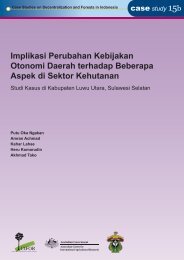Where the power lies: multiple stakeholder politics over natural ...
Where the power lies: multiple stakeholder politics over natural ...
Where the power lies: multiple stakeholder politics over natural ...
Create successful ePaper yourself
Turn your PDF publications into a flip-book with our unique Google optimized e-Paper software.
people, coincidences of finding documents, coincidences of context and coincidences of<br />
timing that have much to do with <strong>the</strong> type of data that is collected.<br />
Over different issues, <strong>stakeholder</strong>s regroup and <strong>the</strong>re are sometimes different types of<br />
relations among <strong>the</strong>m. So at any given point, one can expect to have a complex constellation<br />
of relations <strong>over</strong>lying each o<strong>the</strong>r. Over much more critical issues, <strong>the</strong>se constellations may<br />
be easy to identify, but <strong>over</strong> less critical issues, <strong>the</strong>y may be less visible, but still exist.<br />
What to look for:<br />
<strong>Where</strong> are <strong>the</strong> relations played out?<br />
What form do <strong>the</strong> relations take?<br />
What drives <strong>the</strong> processes through which <strong>the</strong> relations are formed? and<br />
What is <strong>the</strong> effect of <strong>the</strong>se <strong>power</strong> relations on management?<br />
Relations between different <strong>stakeholder</strong>s impact <strong>the</strong> group to varying degrees. Not all<br />
relations, whe<strong>the</strong>r conflict or cooperation, have an adverse effect on <strong>the</strong> group. However,<br />
<strong>the</strong> balance of <strong>power</strong> must be maintained in a state where no one <strong>stakeholder</strong> or faction<br />
within <strong>the</strong> group holds absolute <strong>power</strong> and cannot be challenged.<br />
Methodological issues:<br />
For this type of analysis one needs to be very sensitive to context, i.e. have a sense of<br />
time and place and be careful to not offend. Such sensitivity will determine when you<br />
speak, with whom you speak and how you approach <strong>the</strong> subject. You will need to investigate<br />
<strong>the</strong> source and conditions under which <strong>the</strong> information is being given. Specific issues<br />
may relate to your appreciation of <strong>the</strong> following:<br />
24<br />
Who talks about <strong>power</strong>?<br />
<strong>Where</strong> can one discuss <strong>power</strong>?<br />
Who is present during <strong>the</strong> discussion?<br />
With whom can one discuss <strong>power</strong>?<br />
What is <strong>the</strong> relationship between <strong>the</strong> person giving <strong>the</strong> information and <strong>the</strong> one receiving it?<br />
What is <strong>the</strong> perception of <strong>the</strong> respondent <strong>stakeholder</strong> about <strong>the</strong> person receiving<br />
<strong>the</strong> information (i.e. <strong>the</strong>ir affiliations, alliances, roles and place within <strong>the</strong> group).<br />
It is also important that one is able to interpret <strong>the</strong> ‘language’ used in discussing relations.<br />
Quite often in some cultures, veiled statements, metaphors and o<strong>the</strong>r conversational<br />
tactics are used to deliberately avoid direct reference. It would be important in <strong>the</strong>se<br />
instances to check interpretations of this ‘language’ with o<strong>the</strong>rs before documenting<br />
one’s interpretations. There are political as well as cultural norms that influence where<br />
and how we can talk about relationships among <strong>stakeholder</strong>s.<br />
Some field workers have indicated that <strong>the</strong> problem of familiarity with <strong>the</strong> <strong>stakeholder</strong>s can be<br />
resolved by working with someone who is familiar with <strong>the</strong> group. In both sites in Zimbabwe,<br />
discussing issues like witchcraft, illicit relationships between married people or political<br />
affiliations was very sensitive yet our appreciation of some of <strong>the</strong>se attributes is crucial to our<br />
understanding of group dynamics at a local level, where some <strong>stakeholder</strong>s have <strong>the</strong>se attributes.<br />
However, in some situations where <strong>the</strong> outsider is very well known in <strong>the</strong> area, some of this<br />
data is derived through less informal methods through everyday gossip, or catching up between<br />
friends and neighbours. In one example, in Zimbabwe, <strong>the</strong> researcher found that less formal<br />
association and communication with <strong>the</strong> community was one way to ga<strong>the</strong>r data. However this<br />
data is embedded within wider conversation about events in <strong>the</strong> community. In <strong>the</strong> case presented<br />
in Box 11, he describes events related to one of <strong>the</strong> key <strong>stakeholder</strong>s in a community project.

















